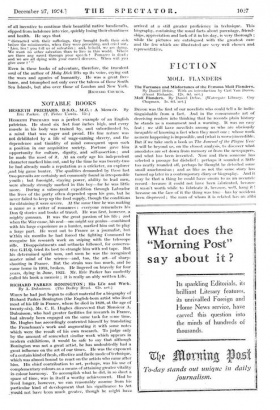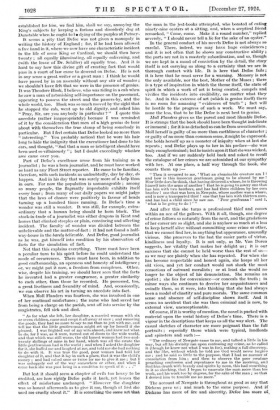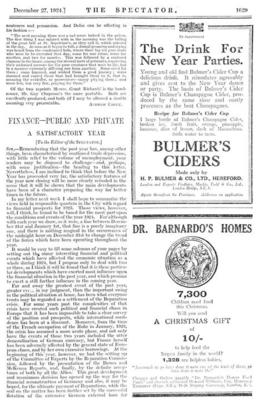FICTION
MOLL FLANDERS
The Fortunes and Misfortunes of the FtemOus Moll Flanders. By Daniel Defoe. With an introduction by Carl Van Doren. (Grant Richards. I2s. 6d. not.) DEF0E was the first of our novelists who could tell a lie indis- tinguishable from a fact. And in the consummate art of deceiving readers into thinking that he records plain history he stands as a monument and a warning. It was no easy feat ; we still have novelists among us who are obviously incapable of knowing a fact when they meet one ; whose work as mere 'happening is impossible, and (what is worse) incredible. But if we take such a book as The Journal of the Plague Year it will be beyond us, on the closest analysis, to discover what anecdotes are set down from memory or from the newspapers, and what has been invented. Now and then someone has selected a passage for disbelief : perhaps it sounded a little too neatly rounded off, perhaps he thought lie detected sonic small anachronism ; and as like as not the same story has turned up later in a contemporary diary or biography. And it may be that a thing he could have sworn to as an accurate record—because it could not have been fabricated, because it wasn't worth while to fabricate it, because, well, hang it ! because on the face of it the thing was true—has by accident been disproved ; the man of whom it is related has an alibi
established for him, we find him, shall we say, annoying the King's subjects by keeping a furious and disorderly dog at Dunstable when he ought to I. dying of the purples at Putney.
It seems a pity that Defoe was not given a monopoly in writing the history of England ; for, if he had been allowed a free hand in it, where we now have one characteristic incident in the life of some King or Cardinal, we should then have twenty ; all equally illuminating, all equally enlivening, and (with the leave of Dr. Schiller) all equally true. And it is hard to say how this divine gift of creating fact that would pass in a court of law came to descend on Defoe. He is not in any sense a great writer or a great man : I think he would have passed by in an assembly without any stir of wonder ; we shouldn't have felt that we were in the presence of genius. It was Theodore Hook, I believe, who was riding in a cab when he saw a man of astonishing self-importance on the pavement, appearing to possess the street and the passers-by, and the whole world, too. Hook was so much moved by the sight that he stopped the cab, went up to old dignity, and asked him " Pray, Sir, are you anybody in particular ? " I quote this anecdote (rather inappropriately) because I was reminded of it by the consideration that men of a high genius do bear about with themselves the true stamp of being somebody in particular. But I feel certain that Defoe looked no more than " interesting." You probably noticed that he wore his hair long to hide the indignity that the executioner had done to his ears, and thought, "Sad that a man so intelligent should have been used so villainously " ; but I doubt exceedingly whether awe came over you.
Part of Defoe's excellence arose from his training as a journalist ; he was a born journalist, and he must have worked as hard as any Fleet Street reporter. He came to be familiar, therefore, with such incidents as undoubtedly, day by day, do happen. And in his day that was surely more of a help than in ours. For now the population is unmanageable ; among so many people, the flagrantly improbable exhibits itself every hour ; from many of our daily papers we might judge that the laws of chance were positively in favour of heads turning up a hundred times running. In Defoe's time a wonder was still a wonder. It was still, for example, extra- ordinary that a human being should be born black. The stock-in-trade of a journalist was either dragons in Kent and horses that climbed steeples or plain, convincing and affecting incident. The faculty of wonder was divided between the unbelievable and the matter-of-fact : it had not found a half- way-house in the barely believable. And Defoe, good journalist as he was, got himself into condition by his observation of facts for the simulation of fact.
Not that this explains everything. There must have been a peculiar turn to his spirit before -he could understand the mode of occurrences. There must have been, in addition to good craftsmanship, an openness and honesty of intelligence ; or, we might put it now, a freedom from complexes. Other- wise, despite his training, we should have seen that the facts he invented had a greater congruence, a greater similarity to each other, than those he recorded. He possessed, too, a great liveliness and fecundity of mind. And, occasionally, . we can observe his art in turning an anecdote into fact.
When Moll Flanders was fourteen, she was involved in one of her continual misfortunes ; the nurse who had saved her from being a charge on the parish, sent off into service by the magistrates, fell sick and died.
" As for what she left, her daughter, a married woman with six or seven children, came and swept it all away at once ; and removing the goods, they had no more to say to me than to jest with me, and toll me that the little gentlewoman might set up for herself if she pleased. I was frighted out of my wits almost, and knew not what to do, for I was, as it were, turned out of doors to the wide world, and that which was still worse, the old honest woman had two-and- twenty shillings of mine in her hand, which was all the estate the little gentlewoman had in the world ; and when I asked the daughter for it, she huffed me and laughed at me, and told me she had nothing to do with it. It was true the good, poor woman had told her daughter of it, and that it lay in such a place, that it was the child's money • and had called once or twice for me to give it me ; but I was unhappily out of the way somewhere or other, and when I came back she was past being in a condition to speak of it . . ."
But lest it should seem a chapter of evils too heavy to be credited, see how rightly Defoe pulls it back, yet leaves the
effect of misfortune unchanged. " However the daughter was so honest afterwards as to give it me, though at first she
used me cruelly about it." • It-is somethiwtthe same art that
the man in the jest-books attempted, who boasted of eating ninety-nine oysters at a sitting, and, when a sceptical friend
remarked, " Come, come. Make it a round number," replied severely, " I should never tell a lie for the sake of an oyster."
In the general conduct of his novels Defoe is not always so careful. There, indeed, we may have huge coincidences ; and it is not often that he shows any constructive ability ; the parts arc not in a masterly subordination, and so, though we are kept in a mood of conviction by the detail, the story itself is not carrying us along to a certainty that we are in thorough contact with life. It is here that Defoe fails ; it is here that he must serve for a warning. Memory is not the only available, nor the best, Mother of the Muses ; there is a type of inspiration in which the theme itself, the state of spirit in which a work of art is being created, compels and vivifies the incidents into credibility, no matter what they
be. And in this extreme of art (which is genius itself) there is no room for amassing " evidences of truth " ; fact will
be hostile to the progress of such a work. We must say, none the less, that to be like Defoe is next best to genius.
Moll Flanders gives us the purest and most likeable Defoe. It is strange that the book should have been thought indelicate or immoral ; for it is as detached as can be from sensationalism. Moll herself is guilty of no more than earthliness of character ; or guilty of no more than common sense, it might be expressed. She holds herself up as a monster of iniquity when at last she repents ; and Defoe plays up to her in his preface—she was truly enough criminal ; but he insists upon it that she was wicked, too. And if we are suddenly held back and asked to recall the catalogue of her crimes we are astonished at our sympathy
with her. At one place, a half way through the book, she counts them up :—
" Then it occurred to me, ' What an abominable creature am I ! and how is this innocent gentleman going to be abused by me ! How little does he think, that having divorced a whore, he is throwing himself into the arms of another ! that he is going to marry one that has lain with two brothers, and has had three children by her own brother ! one that was born in Newgate, whose mother was a whore, and is now a transported thief ! one that has lain with thirteen men, and has had a child since he saw me. ' Poor gentleman ! ' said 1, ' what is he going to do ? ' "
And after this she turps a professional thief and comes within an ace of the gallows. With it all, though, one degree of crime follows so naturally from the next, and the gradations of her career arc so slight, and she is anyhow so much at a loss to keep herself alive without committing some crime or other, that we cannot find her, in anything but appearance, unusually vicious. She preserves to the last the easier parts of virtue, kindliness and loyalty. It is not only, as Mr. Van Doren suggests, her vitality that makes her delight us ; it is our sureness that she cannot be held worse than the rest of us— as we may see plainly when she has repented. For when she has become respectable and honest again, she keeps all her old vices, and yet her conduct would not shock the most censorious of outward moralists ; or at least she would no longer be the object of his denunciation. She remains an egotist ; she lies for convenience—or conceals the truth ; in minor ways she continues to deceive her acquaintances and swindle them, as it were, into thinking that she had always been a model of chastity and pure morals. The same common sense and absence of self-discipline shows itself. And it seems an accident that she was then criminal and is now, to external view, unexceptionable.
Of course, if it is worthy of mention, the novel is packed with material upon the social history of Defoe's time. There is a vigour in the descriptions that keeps us all the way alert. The casual sketches of character are more poignant than the full portraits ; especially those which were typical, landlords and spinsters and such :—
" The ordinary of Newgate came to me, and talked a little in his way, but all his divinity ran upon confessing my crime, as he called it (though he knew not what I was in for), making a full discovery, and the like, without which he told me God would never forgive me ; and he said so little to the purpose, that I had no manner of consolation from him ; and then to observe the poor creature preaching confession and repentance to me in the morning, au 1 find him drunk with brandy and spirits by noon, this had something in it so shocking, that I began to nauseate the man more than his work, and his work too by degrees, for the sake of the man ; so that I desired him to trouble me no more."
The account of Newgate is throughout as good as any that Dickens gave us ; and much to the same purpose. And if Dickens. has more of fire and sincerity, Defoe has more of
acuteness and persuasion. And Defoe can be affecting in his fashion :-
" The next morning there was a sad scene indeed in the prieon. The first thing I was saluted with in the morning was the tolling of the great bell at St. Sepulchre's, as they call A, which ushered in the day. As soon as it began to toll, a dismal groaning and crying was heard from the condemned hole, where there lay six poor souls who were to be executed that day, some for one crime, some for another, and two for murder. This was followed by a confused clamour in the house, among the several sorts of prisoners, expressing their awkward sorrows for the poor creatures that were to die, but in a manner extremely differing one from another. Some cried for them ; some huzzaed, and wished them a good journey ; some damned and cursed those that had brought them to it., that is, meaning the evidence, or prosecutors—many pitying them ; and some few, but very few, praying for them."
Of the two reprints Messrs. Grant Richards' is the hand- somer, Mr. Guy Chapman's the more portable. Both arc excellently produced, and both (if I may be allowed a double




























 Previous page
Previous page